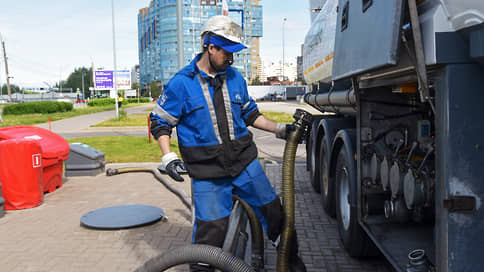Since September, oil companies will have to increase sales of fuel on the stock exchange
[ad_1]

From September, oil companies will be required to increase sales of fuel on the stock exchange to 13% of the production of gasoline and 9.5% of diesel fuel, respectively. The FAS told Kommersant that they had sent a corresponding draft government decree, which concerns the spot market. But analysts believe that only increased sales will not lead to a significant reduction in wholesale fuel prices.
The government is agreeing to increase the mandatory standard for exchange sales of gasoline and diesel fuel on the spot market by 1 percentage point (pp) from production, sources familiar with the situation told Kommersant. It is assumed that the oil companies will now sell 13% and 9.5% of the production of gasoline and diesel fuel, respectively, from September to the St. Petersburg International Commodity Exchange. According to Kommersant, on July 24, Deputy Prime Minister Alexander Novak held a meeting on the growth of standards. This issue was also agreed by the departments last week.
On July 24, the government announced that Mr. Novak supported limiting the number of gasoline exporters (more on this the day before reported “Kommersant”), and also “instructed the Federal Antimonopoly Service and the Ministry of Energy to continue working with oil companies to increase sales of motor fuel in the oil products market, including through exchange trading.”
The FAS told Kommersant that they had sent to the government “a draft resolution on increasing the standards for sales of petroleum products.”
The requirements apply to all oil producers who receive damper payments, the service added. They also confirmed a change in the standards by 1 p.p. for gasoline and diesel fuel. The service emphasized that the changes concern only the spot market. This will increase the volume of sales of gasoline and diesel in the domestic market, the FAS noted.
Alexander Novak, at a meeting with oil companies on June 30, instructed the FAS and the Ministry of Energy to ensure an increase in standards. Thus, the departments had to adjust the joint order, as well as prepare a draft government decree.
The initial draft of the FAS order, which was posted for public discussion, caused controversy among market participants. He assumed that exchange norms for sales in the futures market, and not in the spot market, would be increased by 1 percentage point. But this approach did not suit the Ministry of Energy and oil companies, so the position was adjusted.
The situation on the fuel market remains tense. The wholesale price of gasoline at SPIMEX has been daily updating historical highs since last week.
On July 24, the cost of AI-92 and AI-95 increased by 0.5% and 0.4%, to 64.3 thousand and 69.9 thousand rubles. per ton, respectively. The wholesale price for the AI-92 has already exceeded the cut-off price at which the damper is reset.
The rise in wholesale fuel prices is already active broadcast into gas station prices, which have been on the rise in recent weeks. Last week, the increase in the cost of fuel at filling stations already exceeded the inflation accumulated since the beginning of the year, although keeping prices in line with inflation was one of the government’s priorities. “We have no particular problems with diesel, both with volumes and with prices. Year on year growth even on stock exchanges is 5-7%. At filling stations, both for diesel and gasoline, our prices are rising at the level of inflation, for the end consumer prices are kept. We are mainly working on the stock exchange now, so that the situation there stabilizes, ”quoted TASS Deputy Prime Minister Alexander Novak last week.
According to Sergei Kondratyev from the Institute of Energy and Finance, a 1 pp increase in the norm will not significantly affect prices, but the spread between exchange and OTC wholesale prices, now reaching 5%, is likely to narrow slightly. The problem with rising prices, in his opinion, is due to the fact that now there is an objective situation on the market in which fuel supplies for export are more profitable, and supply is limited due to repairs at refineries.
[ad_2]
Source link





